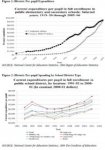- Joined
- Oct 11, 2011
- Messages
- 2,018
- Reaction score
- 918
- Gender
- Undisclosed
- Political Leaning
- Undisclosed
FreedomFromAll said:Enrollment declines in Toledo Public Schools … The decline means less money and a continually shrinking district
Yes, I had heard about this; essentially a limited version of the interim voucher program that I recommended earlier. This particular program (started in ’05) is specifically for students who are currently attending chronically under-performing public schools. These students may request a voucher which allows that tax money to move with them to an approved charter or religious school.
There are a few studies out regarding the results to date. One by the Cato Institute focuses on how “the threat of losing students to the voucher program affected standardized test performance in traditional public schools.” This particular study has determined that the expected outcome of this voucher program will result in one of the following scenarios: (1) the program will lead to increased efficiency and academic performance for traditional public schools, as well as mitigating socioeconomic segregation levels; (2) the program will draw critical scarce resources (both dollars and motivated students and parents) away from the traditional public schools resulting in declining levels of quality, and exacerbate segregation along socioeconomic lines; and (3) the program, in its current form, is too small and limited to have much real effect on the traditional public schools in terms of academic quality, efficiency, or segregation.
The results of the data suggest that schools which are most likely threatened to lose students due to the voucher program make “strong gains” in increasing the scores of the lowest and highest performers. The study itself is rather lengthy but a good read.
Another study by The Friedman Foundation concluded that “In 2006-07, its first year of operation, the EdChoice program produced substantial academic improvements in Ohio’s most stubbornly underperforming public schools. Positive effects were detected in some grades, and no negative effects were detected in any grades.”
Ultimately, of course, the jury is still out but if common sense and empirical evidence from the rest of the economy are of any value we will value competition.
FreedomFromAll said:When was the last time that you sent a letter? I know that I haven't sent a letter in the last decade.
When was the last time you sent a letter through anyone other than the USPS? The point is that delivery of standard mail has never been something which was priced according to demand and which was never open to competition.
Aunt Spiker said:I do not have mountains of money to dump on enrollment and fees for my kids to attend school.
$200 for a K-12 home school kit. I’m sure with a little bit of ingenuity a stay-at-home mom/dad could purchase one of these kits and teach your children for virtually nothing. Even more bizarre would be to eliminate the taxes you pay for education which would give you a sizeable chunk to spend on your children’s education in whichever manner you see fit. Even public school if you desire.
Aunt Spiker said:Without strong parental support and involvement in a child's education even private school fails to deliver.
Probably. On the flip side, however, with strong parental support and involvement a private school certainly cannot fare any worse than a public school or parents would not spend the extra money. When you contrast them in this light, common sense tells us that private schools are better than public schools from the perspective of those who purchase their services. That’s the great thing about competition though; because there is no “one size fits all” approach to education (or anything else for that matter), it allows dozens or hundreds of schools to pop up and offer unique and specialized types of education. You may seem to think that “the way it’s always been done” is the best way to do it in the future as well but I would prefer to see thousands of competing methods to offer education which would allow each of us to consume what we desire.


